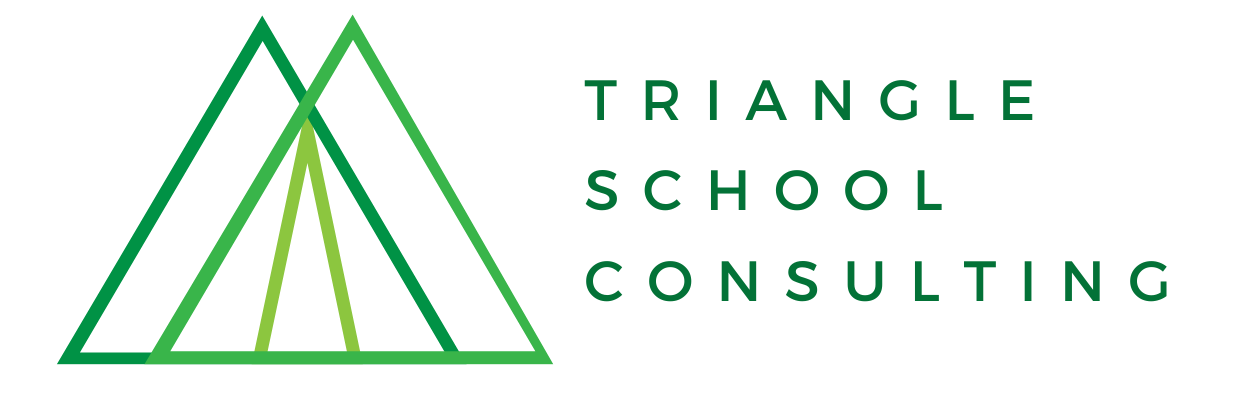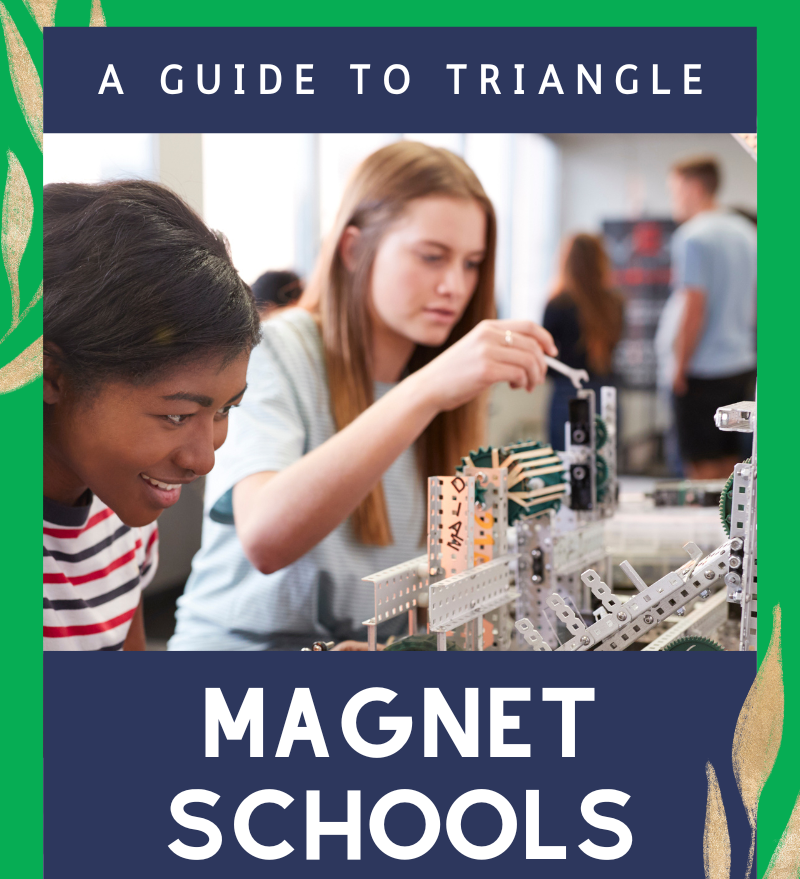MAGNET SCHOOLS IN THE TRIANGLE
Did you know there are 119 magnet schools in the Triangle area? That’s a lot of school choice for parents to wade through! But do not fear- we’re here to help.
What you’ll find in this article:
What Is a Magnet School?
Magnet schools are public schools with a specialized focus or instructional method. They are designed to attract students from diverse backgrounds by offering distinctive programs that often focus on a particular theme or academic area. The term “magnet” refers to their ability to draw students based on their specific interests or talents rather than their geographical location. Students can attend (or apply to attend) a magnet school within their district, even if it is not the family’s zoned neighborhood school.
Advantages of Magnet Schools
- Specialized Programs: Magnet schools offer unique programs tailored to students’ interests, which may include STEM (Science, Technology, Engineering, and Mathematics), language immersion, or performing arts. This allows students to spend additional time in content areas that they are interested in.
- Diverse Student Body: Magnet schools often attract students from different neighborhoods and backgrounds, which can help to diversify the school. Students will not necessarily be attending school with their immediate neighbors so they may be exposed to a more diverse student body.
- Increased Parental Involvement: Because parents have to opt-in for magnet schools (perhaps signing up for a random lottery or assisting their child with the application process), magnet schools often have high rates of parental involvement simply because the student population has had to self-select into the program in the first place.
- Innovative Teaching Methods: Magnet schools may employ alternative teaching methods tailored to the specialized theme of the school. Examples may include project-based learning, interdisciplinary studies, or language immersion programs.
Challenges of magnet schools
- Limited Accessibility to All Students: Despite being public schools, many magnet schools operate on a lottery system, meaning that only a select group of students can take advantage of the program. Some magnet schools may have admission criteria such as academic performance, auditions, or portfolio submissions, which can further limit access to certain students.
- Transportation Challenges: Since magnet schools draw students from across a district, transportation logistics can pose a challenge. Students who take the school bus may have extremely long commutes if they live far away from the magnet school.
- Limited Duration of Program: Many magnet schools’ specialization may not necessarily exist across all grade levels so if your child attends a certain specialized elementary school, the school district may not have that same program available for middle school.
- Varying levels of implementation: Magnet school programs are only as good as the administration and teaching experience within the school. It can be challenging for public schools to find enough highly specialized teachers so it’s common that some teachers are trained/certified in the given magnet specialization while other teachers are not. Specialized training for teachers can often be in conflict with district budget restraints.
ARE MAGNET SCHOOLS BETTER THAN TRADITIONAL SCHOOLS?
You may be wondering: “do magnet schools perform better than traditional schools?” “Will my child receive a better education at a magnet school?” Well, the answer here is not straightforward. While some studies show that magnet schools do achieve higher academic outcomes or graduation rates than traditional schools, some critics argue that performance differences are primarily attributed to the self-selection of students and families who actively seek out magnet school programs. Additionally, it is important to remember that the effectiveness of magnet schools (as well as traditional schools) varies depending on factors such as the quality of instruction, school leadership, parental involvement, and resources available. Additionally, North Carolina magnet schools still provide the required NC Standard Course of Study, they take all the required standardized tests as traditional public schools and are governed by the local Board of Education. Depending on your opinion, you may like these aspects of the magnet schools or you may feel that they are not as different from the public school constraints as you had hoped.
What does the research say?
The research on magnet schools is mixed. Magnet schools are implemented in different ways therefore it is difficult for research to pinpoint what might make a magnet school perform better or worse than its traditional school counterpart. There is one area of research that is more consistent with positive outcomes for magnet schools and that is school diversification. Research suggests that magnet schools generally have a positive effect on school desegregation and bringing together a more diverse group of students. The research on academic outcomes, however, is mixed: while some studies demonstrate small academic gains from magnet school students, other studies find no significant effect when compared to traditional schools.
ARE ALL MAGNET SCHOOLS CREATED EQUALLY?
The success and implementation of magnet schools vary widely so it is important for you to do your research on individual schools to determine the quality of the school. There is an organization called Magnet Schools of America which gives out awards to nationwide magnet schools. Schools are required to be a paid member of MSA and to apply to be a recognized school so while these awards do indicate some level of dedication or distinction, it’s important to recognize how the awards decisions are made.
The most common types of magnet schools in the Triangle:
- Year-round schools
- STEM (Science, Technology, Engineering and Math) focus
- Arts and Humanities
- Language-Immersion program
- International Baccalaureate
- Montessori
- Early Colleges
IS A MAGNET SCHOOL RIGHT FOR MY CHILD?
Good magnet schools offer a compelling alternative to traditional public education, providing specialized programs that cater to various student interests and talents. As a parent, it’s important you ask yourself these questions when weighing the options of magnet schools:
- What is my child interested in? Is there a “perfect fit” magnet school that aligns with my child’s talents and interests?
- How long has the magnet program been around?
- What do parents in your community say about the program?
- How accessible is the magnet school for my family? How will the commute impact our family?
- How is the specialty of the magnet school you are considering implemented day-to-day in the school? How much of the school day is spent focusing on that topic area?
- If the magnet school is a content-specialty (like Arts or STEM), how many of the teachers are trained in that area?
Want to hear firsthand experience from magnet school teachers and parents?
We’ve got a great podcast episode to help you learn even more- check it out!
LOCAL LIST OF TRIANGLE MAGNET SCHOOLS
Durham Public Schools- Magnets
IB SCHOOLS
- Burton Elementary Magnet– International Baccalaureate (IB)
- EK Powe Elementary– International Baccalaureate (IB)
- James Shepherd Magnet Middle– International Baccalaureate (IB)
- Hillside High School– International Baccalaureate (IB)
MONTESSORI SCHOOLS
- Morehead Montessori (Elementary)
- George Watts Montessori (Elementary)
- Little River Montessori (Elementary)
- Lakewood Montessori Middle
- Lucas Middle School (beginning 2025-26)
DUAL LANGUAGE
- Holt Elementary Language Academy
- Merrick-Moore Elementary
- Club Boulevard
- Lyons Farm Elementary
- Southwest Elementary School
- Brogden Middle School
SPECIALTY MIDDLE AND HIGH SCHOOLS
- Durham School of the Arts (6-12th grade)
- School for Creative Studies (6-12th grade, but high school is being phased out)
- Lowe’s Grove Middle School– STEM
- Neal Middle School– STEM
- Southern School of Energy and Sustainability (High School)- STEM
- Durham Early College of Health Sciences
- JDC Early College
- City of Medicine Academy (Health and Life Sciences)
- Durham School of Technology (High School, IT and Computer Science)
*Durham also offers Year-Round schedules at 7 magnet schools
Chapel Hill Magnet Schools
Mandarin Dual Language Program: Glenwood Elementary School and Phillips Middle School.
Spanish Dual Language Program: Carrboro Elementary School and Frank Porter Graham Bilingüe. Culbreth Middle School and McDougle Middle School.
Orange County Schools
- Hillsborough Elementary School (K–5) is a year-round school.
- Central Elementary School: Engineering is Elementary
- Efland-Cheeks Global Elementary School: Global Competencies
- Cedar Ridge High School: International Baccalaureate (IB)
Wake County Magnet Schools
- Douglas Magnet Elementary
- Wildwood Forest– Arts and Design Elementary
- Brooks Magnet Elementary– Museums Elementary
- East Millbrook Magnet Middle– Arts and Design
- Garner Magnet High– International Baccalaureate
- Millbrook Magnet High– International Baccalaureate
- Farmington Woods Magnet Elementary,(IB)
- Fox Road Magnet Elementary (IB)
- Smith Magnet Elementary (IB)
- Joyner Magnet Elementary
- East Garner Magnet Middle (IB)
- West Millbrook Magnet Middle (IB)
- Enloe Magnet High (IB)
- Southeast Raleigh Magnet High– Arts and Engineering
- Stough Elementary– Mandarin Language Immersion
- Oberlin Middle- Mandarin Language Immersion
- Broughton High- Mandarin/Spanish Language Immersion
- Hodge Road– Elementary Spanish Language Immersion
- Smith Elementary- Spanish Language Immersion
- Jeffreys Grove Elementary
- Dillard Drive– Spanish Language
- Athens Drive High- Spanish Language Immersion
- Green Magnet Elementary– World Languages
- Wiley Magnet Elementary– International Studies
- East Cary Magnet Middle– Global Studies
- Bugg Magnet Elementary– Design and Computer Sciences
- Brentwood Magnet Elementary– Engineering
- Conn Magnet Elementary– Entrepreneurial Design
- A.B. Combs Magnet Elementary– Leadership
- Kingswood Magnet Elementary– Montessori
- Lincoln Heights Magnet Elementary– Environmental Connections
- Millbrook Magnet Elementary– Environmental Connections
- Wake Forest Elementary– STEM
- Reedy Creek Magnet Middle– Digital Sciences
- Carroll Magnet Middle– Leadership in Technology
- Centennial Magnet Middle– Innovation
* Wake County also offers 48 Year-Round Magnet Schools

